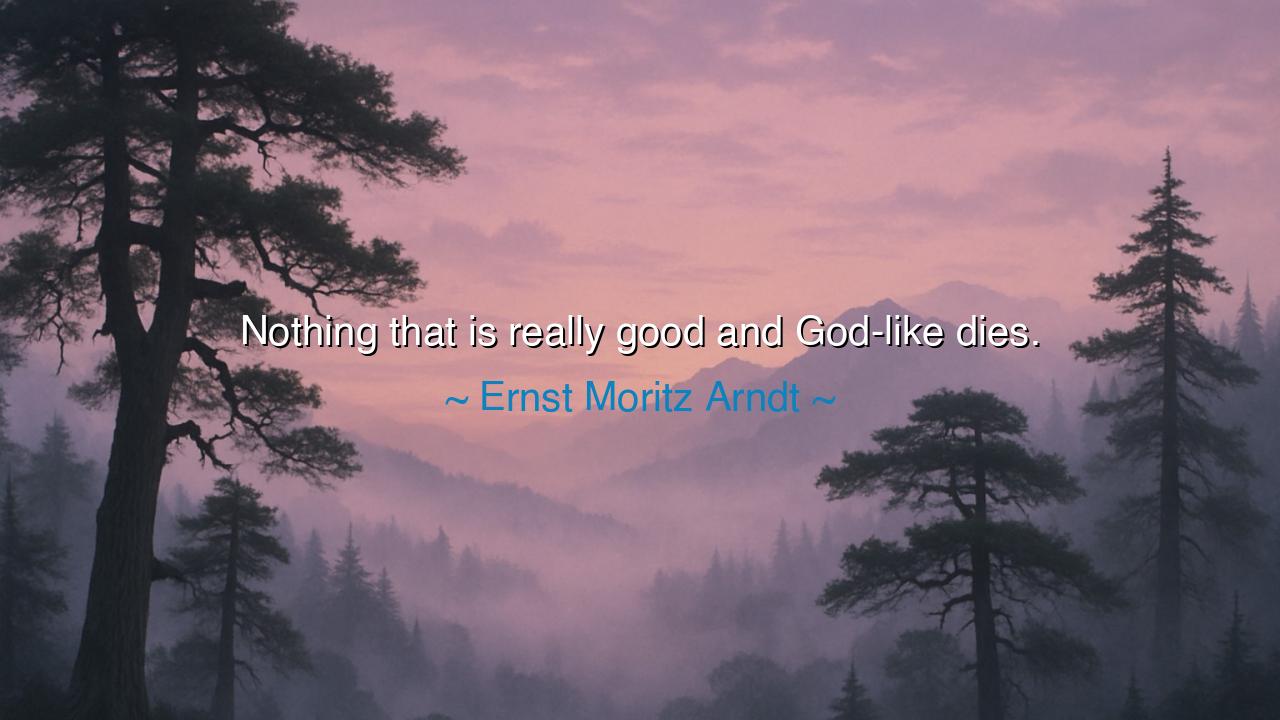
Nothing that is really good and God-like dies.






“Nothing that is really good and God-like dies.” Thus spoke Ernst Moritz Arndt, the poet and patriot of Germany, whose heart burned with both faith and defiance. These words, though simple in form, shine with the radiance of eternal truth. In them, Arndt reminds us that goodness—true goodness, the kind that is touched by the divine—cannot perish, even when its mortal vessel fades. The body may fall to dust, the voice may be silenced, the monument may crumble; yet the spirit of what is noble, pure, and God-like endures beyond decay. For goodness belongs not to the realm of time, but to eternity, and eternity knows no death.
Arndt lived in an age of war and upheaval, when nations rose and empires fell, when ideals were tested in the crucible of history. He saw the tyranny of men and the suffering of peoples, yet he believed that the light of virtue and faith could not be extinguished by the darkness of violence. His words were born of both grief and conviction—grief for the transience of worldly things, and conviction that the divine essence within humanity survives all loss. When he said that “nothing good and God-like dies,” he spoke not of mere comfort, but of an unyielding truth: that the soul of righteousness is immortal.
This belief, though ancient, is woven through every age. The Greeks called it arete—the excellence of soul that cannot be touched by death. The Stoics taught that virtue is the only good, and that it outlives both flesh and empire. And the Christians, to whom Arndt belonged, saw in the resurrection of Christ the ultimate proof that the spirit of love, sacrifice, and truth cannot be slain. For what is truly God-like is not of this earth—it is a spark of the eternal fire, and even when the wind of mortality blows, that spark leaps from form to form, lighting new hearts with its flame.
Consider the life of Socrates, who drank the poison with serenity, believing that no man could harm what was good within him. His enemies condemned his body, but his words, his virtue, and his courage live still. Or think of Joan of Arc, whose body was burned to ash, yet whose faith and valor ignited a nation’s spirit for centuries. Their lives were brief, but their goodness was eternal, for it was God-like—born of truth, love, and unwavering conviction. What perished was the vessel; what endured was the light within it.
The meaning of Arndt’s words, then, is not only metaphysical but moral. He calls us to live in such a way that what we create and who we are may outlive our mortal span. To do good, to love, to speak truth, to act justly—these are the ways by which we touch eternity. The selfish man builds for himself and perishes with his possessions; the righteous man builds for the soul, and his deeds ripple beyond his lifetime. What is God-like within us—the compassion, the courage, the creativity, the capacity to forgive—these are the seeds that do not die but take root in the hearts of others.
Arndt’s words also carry a quiet warning: that what is not good, what is corrupt, hateful, or false, dies swiftly, no matter how loudly it proclaims itself immortal. The tyrant’s empire crumbles, the liar’s name fades, the selfish man’s riches scatter to the wind. But the teacher’s wisdom, the mother’s kindness, the martyr’s courage—these endure. They become part of the invisible kingdom that no death can conquer. Thus, even in the face of despair, one may stand firm, knowing that goodness is stronger than time.
The lesson, my listeners, is this: live for what will not die. Let your actions spring from the eternal, not from the fleeting. Do not chase glory that fades or wealth that rusts, but build your life upon truth, love, and service. If you must leave the world, leave it brighter than you found it. Speak words that lift the fallen, perform deeds that ease another’s pain, and let your spirit be a channel for the divine. For in every generation, though forms perish and faces vanish, the essence of goodness flows onward, like a river fed by countless hearts.
So remember this: your name may be forgotten, your body may return to dust, but if you have touched even one soul with what is good and God-like, you will not have lived in vain. For goodness is of the eternal, and the eternal does not die. The flame you kindle in another will one day kindle you again in realms beyond sight. Thus, as Arndt declared, nothing that is really good and God-like dies—it only changes form, passing from one heart to the next, until all creation burns with its undying light.






AAdministratorAdministrator
Welcome, honored guests. Please leave a comment, we will respond soon